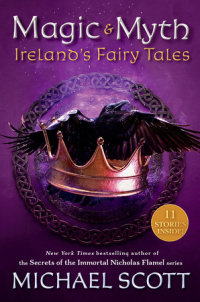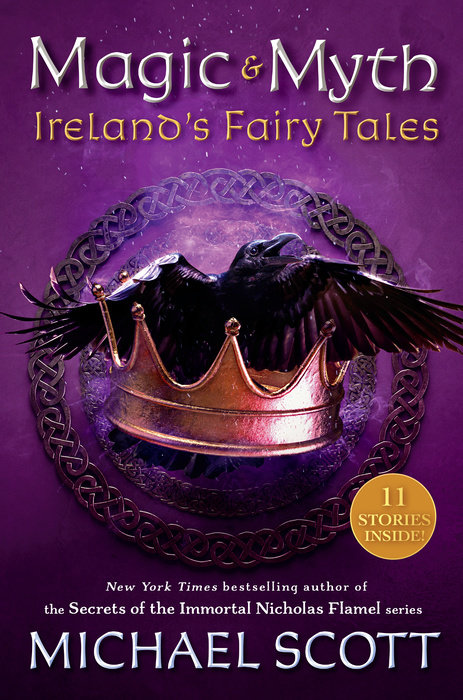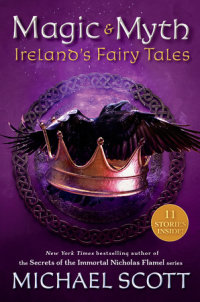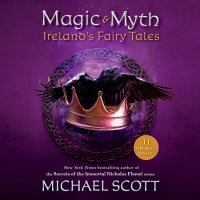A Magical Midnight Dance
Time is different in the Otherworld, in fairy- land: what may seem like only hours there could be years in our human world. It is also said that, once you dance with the fairies, you hear their music forever more. Beware the enchantments of that magical land . . .
Paul sat up in bed. He could hear music coming from outside. He knew it was late because the house was very, very quiet, and the moonlight, which slanted in through his window when he went to bed, was now spilling in through the glass pane on the other side of the room.
He got out of bed, tiptoed over to the window, and peered out. The full moon lit everything in a ghostly silver-white light and somehow made the shadows seem even darker.
But he could see no one.
He listened hard, trying to pinpoint the direction of the noise. It was thin and high, like a pipe or flute, or maybe even the delicate sound of a harp—and it seemed to be coming from the little clump…
A Magical Midnight Dance
Time is different in the Otherworld, in fairy- land: what may seem like only hours there could be years in our human world. It is also said that, once you dance with the fairies, you hear their music forever more. Beware the enchantments of that magical land . . .
Paul sat up in bed. He could hear music coming from outside. He knew it was late because the house was very, very quiet, and the moonlight, which slanted in through his window when he went to bed, was now spilling in through the glass pane on the other side of the room.
He got out of bed, tiptoed over to the window, and peered out. The full moon lit everything in a ghostly silver-white light and somehow made the shadows seem even darker.
But he could see no one.
He listened hard, trying to pinpoint the direction of the noise. It was thin and high, like a pipe or flute, or maybe even the delicate sound of a harp—and it seemed to be coming from the little clump of trees that lay at the bottom of the field.
Paul shivered, not with the cold but with excitement. He crept back to his bed and pulled on his shirt and trousers, grabbing his cardigan as he slipped from the room.
In the next room, his big sister Brona tossed and turned in her sleep. She was dreaming about a waterfall and the musical sound it made as it splashed into the pool beneath. And then she dreamt that she was standing on a plank of wood that was being tossed around on a stormy sea. Suddenly the wood tilted and she fell off—and woke up. Paul was shaking her.
“Wake up, wake up,” he whispered.
“What’s wrong?” she mumbled.
“Music,” he said excitedly. “I can hear music outside.”
“What time is it?” she demanded, realizing how dark the room was.
“Oh, it’s very late. Everyone’s gone to bed, and the moon is beginning to sink.”
“It must be three in the morning,” Brona said angrily, pushing herself up into a sitting position. She was a year older than her brother, ten years old to his nine years, and liked to consider herself more grown-up.
“That doesn’t matter,” Paul said. “Someone is playing music outside.”
“At three o’clock in the morning?” Brona said in amazement. “You’re dreaming!”
“Listen,” he said. “Just listen.”
Brona listened. And she too heard the music.
She hopped out of bed, and she and Paul stood on either side of the window, peering out from behind the curtains.
“I think it’s coming from over there,” Paul said, pointing down toward the trees.
His sister nodded. “I think so too.”
“Let’s go look,” Paul said.
“But it’s late . . . ,” his sister began.
“Tomorrow’s Saturday—we don’t have to be up for school, and no one will know. We’ll just creep out by the back door and have a look. It might be a caravan,” he added excitedly.
“Or the Fairy-Host,” Brona whispered.
“Fairy-Host!” Paul laughed quietly. He didn’t believe in fairies. He wasn’t so sure about ghosts, though.
Brother and sister crept down the garden path, staying close to the bushes and making for the wooden gate. The music was louder now, and they thought they heard distant voices and laughter.
They slipped through the gate and headed down the path toward the music. It was louder and clearer now, and the voices were much clearer, too. Paul and Brona stopped and listened. They weren’t speaking English—it sounded something like Irish, though Paul and Brona weren’t able to make out what was being said.
“It sounds . . . almost familiar,” Brona said, looking over at her brother, her eyes shining silver in the moonlight. “It’s almost as if we should know it.”
Paul nodded. There was something about the language . . .
They crept through the bushes and along the banks of a stream that ran past the foot of their garden. There were three broad, flat stones that they used as stepping-stones, and once over these, they were into the fringes of the little forest. Long, thin beams of moonlight slanted in through the branches of the trees, speckling the ground with patches of deep shadow, making it almost impossible for them to see where they were going.
Suddenly Brona laid her hand on Paul’s arm. He jumped and bit his lip in fright.
“What’s that?” she whispered. He could just make out the shape of her arm pointing straight ahead.
Paul squinted. For a moment he could see nothing. Then he saw a light—more of a dim glow, really—between the trees. A cloud slid across the face of the moon, and the forest went completely black. But they suddenly found that they could see the glow all the more clearly. At the same time, the music and laughter seemed to increase.
Holding each other’s hands, they crept toward the glow.
There was a sudden blare of trumpets, and the forest lit up like a firework, with streamers of colored light darting and slipping through the trees and into the heavens. There were red and green and blue sparks cartwheeling and spinning along the forest floor, and ribbons of what looked like fire—although they didn’t seem to burn—snaked along the pathways.
The young boy and girl were suddenly very frightened. Paul tugged on his sister’s hand. “Come on—let’s go,” he hissed.
She shook her head and pulled her hand free. “No, listen!”
“I can’t hear anything . . . ,” he whined, but she squeezed his hand tight, and he shut up. He listened again. And then he heard it, faint and distant but becoming clearer—the brittle sound of horses’ hooves. He and Brona crouched into the bushes and huddled together.
There was a flash of movement down along the path, and then the bushes parted and two creatures marched into the clearing. They were small, stout men, dressed in bright red waistcoats, with long, heavy green coats over them. They wore old-fashioned three-cornered hats, green tights, and beautifully made shoes with huge silver buckles.
“Leprechauns!” Brona whispered in astonishment.
The two leprechauns held back the bushes as a dozen tiny winged creatures hurried past them. The creatures fluttered up into the low branches of the trees that lined the path.
And then the horses and their riders came into the clearing.
There were two of them. Both horses were tall and thin, with narrow angular features and long pointed ears. Their eyes were huge and glowed brightly.
Their riders were equally strange. The man was very tall, with a sharp, pointed face and snow-white hair. His clothes were old-fashioned but beautifully made from rich fabrics, and there was a sword with a blade of what looked like glass tied to his high saddle.
He was followed by a woman, a small, delicate woman who looked no older than Brona—except for her eyes, which were very old indeed. Her cheekbones were high and her eyes almost catlike. Her hair was silver-white and flowed down her back in a long, shimmering wave. Like the man, she was dressed in the fashion of another age, in a long, trailing gown of green silk that was decorated along the hem and about the neck and sleeves with an ancient Celtic design.
“Who . . . who are they?” Paul whispered into his sister’s ear.
Brona sucked in a breath. “They are the Shining Folk, the Sidhe, the Tuatha De Danann,” she murmured, almost as much to herself as to her brother.
“Fairies?”
Brona nodded. “Fairies. That must be their king and queen.”
“But what are they doing here?” Paul asked.
His sister shrugged. “I don’t know. It must be one of their gatherings, when all the fairy-folk come together to sing and dance through the night. You know,” Brona continued, “you often see the rings of pale grass in the mornings, or circles of mushrooms that have sprung up overnight.”
Paul nodded. “I’ve seen them.”
Brona grinned excitedly. “That’s where they have danced.”
The fairy-king and fairy-queen rode slowly past the bushes that hid the boy and girl. Brona thought she saw the lady glance down as she passed and smile at their hiding place. The two leprechauns hurried forward and once again held back the bushes to allow the royals to ride into the wide glowing circle.
Paul and Brona caught a glimpse of the gathering before the leprechauns stepped through and the bushes dropped back into place. In that instant, they saw a huge party of creatures and beings: there were not only leprechauns, but cluricauns, fir dearg, fir bolg, and tall, wild-haired women with sorrowful eyes that they guessed must be the dreaded banshee. There were animals, too: huge dogs, long-horned cows, bright-eyed hares and rabbits, and a wild-maned, savage-looking creature that they knew must be the terrible Phooka, the demon-horse.
When the bushes closed on the scene, the music began once again—a thin, high, delicate sound. Other musical instruments joined in and soon the tiny forest was alive with sound.
Paul tugged on his sister’s arm. “Come on, let’s go.”
She pulled away. “Not yet. Let’s get closer.”
Paul shook his head. “Don’t be silly. We’re lucky they didn’t spot us when they rode past. What do you think would happen if they caught us here?”



